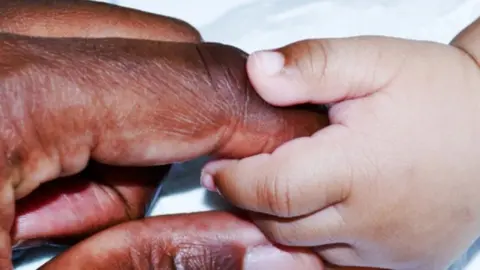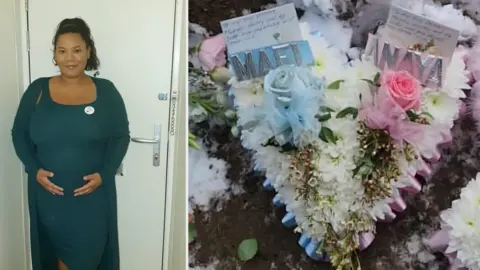Ethnicity affects pregnancy healthcare, research suggests
 Sands
SandsParents whose baby died during pregnancy or shortly after birth believe they received worse care due to their ethnicity, a charity has said.
Baby loss charity Sands spoke to bereaved parents, some of whom believed stereotyping had put them at risk.
Data also shows Black and Asian babies are more likely to be stillborn or die in the neonatal period.
The government has said it is committed to reducing any disparities linked to ethnicity or deprivation.
A spokesperson for the Department of Health said: "NHS England has published guidance for local maternity systems, supported by £6.8m.
"We are also investing an additional £165m per year to grow and support the maternity workforce and improve neonatal care, while NHS England recently published a three-year plan to make maternity and neonatal care safer, more personalised, and more equitable for women, babies, and families."
The survey spoke to 56 Black and Asian bereaved parents and more than half of them felt their treatment was worse due to their ethnicity.
Participants in the Sands study included some Black women who said they were typified as "feisty" or "dramatic" by healthcare staff when they were actually afraid or in pain.
Several Asian participants in the study said stereotyping involved being dismissed as overly anxious or prone to exaggerating health concerns.
 Amber Lincoln
Amber LincolnAmber Lincoln from Woolwich in south-east London was miscategorised as low-risk when she was pregnant with twins.
She is mixed white and Black Caribbean and had previous miscarriages and a short cervix.
She almost died due to undetected complications after her delivery.
She bled profusely and almost died during surgery. This was two weeks after the loss of her twins.
A series of individual and systemic failings led to cancellations and delays.
Her babies Anaya and Mael were born and died at 22 weeks on 23 November 2022, before she could access the care she needed.
Their funeral was held on 12 December.
"What's come to light with my investigation that's happening, is that I was treated as a single pregnancy, and I wasn't treated as high risk.
"If the NHS just listened to me. And just put my appointment through when I was constantly asking. If they had the notes there properly I wouldn't have been treated that way."
Ms Lincoln said the fact she is mixed race led to midwives focussing on diabetes and high blood pressure rather than other high risk indicators.
"I would say every mum - no matter what race, culture, background - every parent, deserves to come home with their babies."
She added: "I want more children. But I am petrified. I would have to trust a system that let me down so badly.
"How do I know it's not going to happen again? What do you do when you crave children so much but you do not trust the system?"
She also has a daughter and worries about her.
She said: "I hope in the future my daughter will worry about chocolate cravings and trying to pick up the TV remote.
"That she is heard and cared for. I don't want her to be another number. Things must change."
Research by the Infant Mortality and Morbidity Studies group at the University of Leicester and Oxford Population Health's National Perinatal Epidemiology Unit used anonymised medical notes to build on the annual Perinatal Mortality Surveillance reports into babies who die before, during, or shortly after birth.
The study looked at the pregnancies of 34 Asian women, 36 Black women, and 35 white women where the baby was stillborn or died within 28 days of being born.
Although the overall proportion of babies who die has reduced over the past five years, there are still big differences in the proportion of babies from different ethnic groups who are dying.
Among all ethnic groups, Black babies now have the highest mortality rates and are twice as likely to be stillborn or die within the first 28 days after birth and Asian babies are over one and a half times more likely compared with white babies.
The Royal College of Midwives said a multi-agency approach is needed to improve maternity outcomes for Black and Asian women as well as those living in the most deprived areas.
A spokesperson said: "Much more needs to be done to address health inequalities and reduce stillbirth and neonatal death among Black and Asian babies.
"Clinicians, including midwives and obstetricians, should receive better education to be aware of the increased risk for Black and Asian women.
"As well as ensuring they receive the appropriate assessment and specialist care, relatively simple measures like improvements in access to translation services and provision of personalised care and support plans could have made a positive difference in the outcomes for these women and babies."

Listen to the best of BBC Radio London on Sounds and follow BBC London on Facebook, X and Instagram. Send your story ideas to [email protected]
